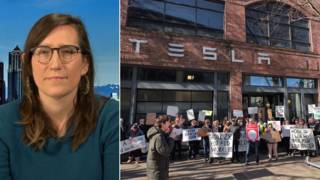HeadlinesSeptember 01, 2016
After Meeting Mexican President, Trump Vows to Deport Millions Within First Hour in Office
In a major speech on immigration in Phoenix, Arizona, Republican presidential nominee Donald Trump vowed to build a massive wall along the Mexican border and to begin deporting millions of immigrants as soon as he takes office, if elected in November. During the speech, he vowed to deport 2 million people within his first hour in office. Trump has made the mass deportation of 11 million undocumented immigrants one of the cornerstone proposals of his campaign. Donald Trump spoke in Phoenix just hours after meeting in Mexico City with Mexican President Enrique Peña Nieto. Trump has sparked outrage among Mexicans by calling them “rapists” and “criminals.” Mexican President Enrique Peña Nieto has fiercely criticized Trump in the past, once comparing him to Adolf Hitler and Benito Mussolini.
Hundreds Protest Trump Visits to Arizona and Mexico
Trump was met by protesters both in Phoenix and in Mexico. In Phoenix, activists gathered outside the Phoenix Convention Center carrying a massive inflated balloon of Donald Trump with a swastika on his jacket. The rally was dubbed “Our Culture Trumps Their Hate” and featured Mexican and indigenous dance performances. In Mexico, activists gathered in downtown Mexico City to protest Trump’s visit and his proposal to build a wall across the entire length of the border. The U.S. already spends billions on border security every year. This is one of the protesters.
Maya Ghazzen: “Well, there’s already a border wall, and, I mean, that mainly affects the most marginalized sectors of the Mexican society. And instead of building community and comprehension and programs to develop the relationship between our two people, it’s putting walls between us, just like they do in Palestine-Israel. And I think it’s very important, the wall, because the same company—and I have to talk about companies because the people who profit from this hate speech are companies and transnationals. So, G4S runs our security, security, our separation wall between Mexico and the U.S., and Palestine-Israel.”
We’ll go to Mexico City and to Phoenix, Arizona, for more on Trump’s speech and his visit after headlines.
Phoenix Approves City ID Cards for Undocumented Immigrants
Trump’s visit came the same day the Phoenix City Council voted to approve ID cards for all Phoenix residents—including people who are undocumented. The move follows similar initiatives in New York City and Los Angeles.
Leaked Memo Tells Democrats How to Deal with Black Lives Matter
In more campaign news, a leaked memo from 2015 shows a Democratic Congressional Campaign Committee staffer instructing Democratic candidates on how to deal with Black Lives Matter activists. The memo calls Black Lives Matter a “radical movement” and tells candidates, “Don’t offer support for concrete policy positions.” The memo was posted online by Guccifer 2.0, a hacker who has claimed to be behind the hack of 20,000 DNC emails that were leaked by WikiLeaks in July. Guccifer 2.0 says the memo came from House Minority Leader Nancy Pelosi’s personal computer. Pelosi’s office has not commented on the memo.
Brazilian Senate Votes to Impeach President Dilma Rousseff
The Brazilian Senate has voted to impeach the country’s democratically elected President Dilma Rousseff from office in what many are calling a coup by her right-wing political rivals. The vote was 61 to 20. Rousseff’s impeachment ends 13 years of the left-wing Workers’ Party rule in Brazil and brings to power President Michel Temer for the remaining two years of Rousseff’s term. Temer is deeply unpopular and currently under investigation himself, accused of receiving illegal campaign contributions linked to the state oil company Petrobras.
U.S. and Cuba Resume Direct Flights After 50 Years
The first direct commercial flight between the U.S. and Cuba in more than 50 years touched down in Santa Clara, Cuba, Wednesday. JetBlue Flight 387 took off from Fort Lauderdale, Florida. Also on Wednesday, U.S. Transportation Secretary Anthony Foxx met with Cuban Foreign Minister Bruno Rodríguez. The meeting and the flight were the latest steps in the thawing ties between Cuba and the United States.
Yemen: U.S.-Backed, Saudi-Led Airstrike Kills 16 Members of Family
In Yemen, a U.S.-backed, Saudi-led airstrike has killed at least 16 people when it struck the home of an imam in Saada Wednesday. Local residents say the strike killed the imam’s extended family, including at least one child. This comes as the U.N. humanitarian coordinator told the U.N. Security Council at least 10,000 civilians have died or been wounded in the 18-month conflict. Last week, U.S. Secretary of State John Kerry traveled to Saudi Arabia and met with the Saudi foreign minister, where he urged a “political solution” to the war in Yemen. The U.S. continues to supply Saudi Arabia with billions of dollars of weapons. These sales have reportedly included internationally banned cluster bombs, which are designed to fan out over a wide area and often fail to explode, posing a massive risk to civilians.
U.S. Arms Manufacturer to Stop Making Cluster Bombs
This comes as the U.S. weapons manufacturer Textron Systems has announced it will stop manufacturing cluster bombs, citing the “current political environment.” Human Rights Watch has documented Textron’s cluster bombs being used by Saudi Arabia in the war in Yemen. Textron’s decision to stop making these munitions comes after years of pressure from activist groups, including from the Cluster Munition Coalition.
Kashmir: Indian Security Forces Kill 1 Protester; Hundreds More Blinded
In Kashmir, Indian security forces have killed another protester, 18-year-old Danish Ahmad, who was shot to death by Indian troops for throwing rocks at an army convoy. It’s at least the 70th confirmed death in Kashmir since anti-India protests erupted on July 8, after Indian security forces killed a prominent Kashmiri independence leader. Hundreds more Kashmir residents have been blinded by lead pellets shot by Indian security forces. Doctors at the main hospital say they’ve seen at least 570 patients whose eyes have been mutilated by the lead pellets. Ophthalmologists are calling the condition “dead eyes.” This is one of the patients, Fayaz Ahmad.
Fayaz Ahmad: “We were a peaceful group of people who did not protest or take part in a procession, when a group of police and Central Reserve Police Force personnel approached us and started firing pellets and tear gas without asking any questions. At least 20 to 25 people were injured. We were taken to a local hospital, from where we were referred to another hospital. On our way there, police and the Central Reserve Police Force personnel took us out of the ambulance and beat us up.”
Divided Supreme Court Blocks North Carolina Voter ID Laws
A divided Supreme Court has refused to reinstate parts of North Carolina’s restrictive voter ID laws, which were blocked last month after a court ruled the measures discriminated against African Americans and targeted them “with almost surgical precision.” The 4-4 decision means up to 5 percent of the state’s registered voters targeted by the law can now vote in the general election.
ND: 2 Stop Dakota Access Construction by Locking Bodies to Machines
In North Dakota, eight people were arrested after two people locked themselves to heavy machinery to block construction of the $3.8 billion Dakota Access pipeline, which would carry 500,000 barrels of crude from the Bakken oilfields of North Dakota through South Dakota, Iowa and into Illinois. It took the police hours to remove Dale American Horse Jr., who was locked to an excavator.
Iowa: 30 Arrested Blocking Dakota Access Pipeline Construction
Meanwhile, 30 people were arrested in Iowa in an effort to block construction of the Dakota Access pipeline there. And in Texas, members of the group Anti-Colonialists Against Billionaires say they poured superglue into the locks on the doors of the corporate offices of Energy Transfer Partners in Dallas before dawn on Wednesday.
2 Mississippi Universities Lower State Flag over Confederate Emblem
Two more universities have taken steps to remove Confederate imagery and emblems from campus. Mississippi State University and the Mississippi University for Women both have decided to remove the state flag because it includes the Confederate battle emblem in the upper left corner. In total, seven Mississippi public universities have removed the state flag from their campuses, leaving only one, Delta State University, left with the flag still flying with the Confederate emblem.
Chicago: Police Move to Fire 5 Officers over Laquan McDonald Killing
In Chicago, Police Superintendent Eddie Johnson says he’s moving to fire five officers over the fatal shooting of 17-year-old African American Laquan McDonald, who was shot 16 times in October 2014 by white police officer Jason Van Dyke. An inspector general report issued two weeks ago recommended the Chicago Police Department fire 10 officers. Superintendent Johnson had previously said he’d move to fire seven officers. Now he says he’s moving to fire five—Officer Van Dyke and four others who are accused of lying during the investigation of the shooting. Van Dyke has been charged with first-degree murder.
22 Immigrant Mothers Resume Hunger Strike at Berks Detention Center
And in Pennsylvania, 22 immigrant mothers have resumed their hunger strike at the Berks County Residential Center after suspending the strike for a week, citing intimidation by ICE officials. The mothers first launched the strike on August 8 to protest Department of Homeland Security Secretary Jeh Johnson’s claims that the average time in family detention is only 20 days. As of today, at least three families will have spent a full year in custody at the Berks facility. This is Margarita.
Margarita: “We are here for one year. We are desperate, really, because it’s traumatic to spend so much time here. So, my son tries to, with his ID, strike around his neck. So, I was worried of him. The psychologist said that he’s going to be OK, that it’s just frustration that he have, but I don’t think that was just frustration, because it’s something more delicate.”
Most popular
- 1
- 2
- 3
- 4
Non-commercial news needs your support
Please do your part today.











Media Options